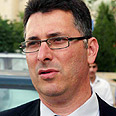
Education Minister Sa'ar has a lot of work on his hands
צילום: גיל יוחנן
Report: Israel fails to invest in education
Center for Political Economics says education budgets in developed countries growing steadily, while Jewish state lags behind
Tough job for new Education Minister Gideon Sa'ar: According to a new report released Monday, Israel is lagging behind the world's developed countries in the level of teachers' salaries and the investment in education and in students.
The Organization for Economic Co-operation and Development (OECD), which includes the world's developed countries, published in September an evaluation of the difference education systems worldwide, which included grim conclusions about Israel.
The MACRO Center for Political Economics, which analyzed the OECD data, released its own report on Monday with new conclusions.
According to the figures, the governmental expenditure per capita in the Israeli education system is one of the highest in the world, standing at 8%, compared to the investment in other developed countries, which is less than 6%.
In light of these data, it is difficult to understand why Israeli students' achievements are so poor: Israel is ranked today below the OECD average in the subjects of reading, science and mathematics, and has dropped seven spots in the rankings since 2003.
The authors of the MACRO report explain that Israel's governments have the habit of boasting about the high expenditure on education, but that this is a mistaken analysis of the findings.
"Examining the expenditure on education is not a measure for the priority Israel gives to education, as this expenditure depends on the size of the product and the percentage of students in the population.
"Israel has a high number of students in relation to the population, and therefore the percentage of expenditure on education as part of the budget does not necessarily testify that more money is allotted for the training of each student," says MACRO Director-General Dr. Roby Nathanson.
Minimal growth in investment per student
Another troubling finding is that while the rest of the developed countries steadily increase their education budget, Israel lags behind and is stagnated.
Twenty out of the 26 OECD countries have increased their education budgets by 20% to 30% between 1995 and 2003. The only countries where the expenditure per student went up by less than 10% were Germany, Italy, Switzerland and Israel.
The report also refers to the teachers' salary as measured before the implementation of the New Horizon reform in the education system. MACRO officials stress that the reform has been implemented in only 800 out of some 4,000 schools, and that it will therefore take time before its influence can be analyzed.
Nonetheless, an examination of the data clearly reveals that the salary of Israel's veteran teachers is 88% lower than that of their colleagues in the developed countries. The MACRO report reiterates a figure included in the September report, that teachers' salaries in Israel are significantly lower than the common wages in OECD countries.
The MACRO center concludes the report by saying that "Israel has a long way to go before it catches up with the developed countries, particularly in terms of teachers' status and compensation… Israel dedicates about 8% of its budget to education, but the decline in its students' achievements in comparative tests continues."










